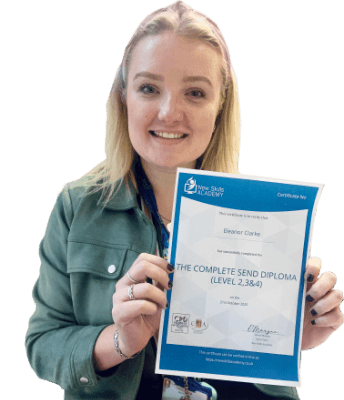Anti-Bullying and Bullying Prevention Diploma
Anti-Bullying and Bullying Prevention Diploma Course
The Anti-Bullying and Bullying Prevention Diploma course provides a general overview on the topic of bullying in primary and secondary schools including knowledge, statistics and advice required in order to be able to understand the topic and effectively deal with bullying incidents. From learning about what bullying is and why children feel the need to bully other children to modern concepts such as cyberbullying.
The course includes an in-depth overview of the legal frameworks that protect children in schools as well as analysis of the laws and government guidance that are applicable to cases of bullying. Bullying is a complex problem that requires active involvement of the entire school community. It also requires that fundamental knowledge on the issue is in place so that meaningful discussions between pupils, parents and teachers are held.
The Anti-Bullying and Bullying Prevention Diploma course has been developed with pupils, parents and teachers in mind and provides all the necessary knowledge required to tackle the bullying in schools issue. Taking the course and working on the additional exercises will assure that you will be better prepared to respond in situations where bullying is present. The additional information that is included on the legal side of bullying will give you a broad understanding of the most important Acts and Regulations and you will know how to talk to school teachers and governors if your child has been a victim of bullying. In particular, the course focuses on discussing special cases of bullying that include disability-based bullying, as well as homophobic, transphobic, racist and other prejudice-based bullying.
Parents will particularly benefit from taking the course as it also gives extensive advice on dealing with bullying and supporting your child should they be affected, including guidance on how to talk to your child and the activities you can engage in together. The course also touches on the need to be tolerant and open-minded and the values and ideas that need to be instilled in children by teachers and parents to prevent bullying occurring in the first place.
What you will learn:
- An introduction to the concept of school bullying
- How to tell if a child has been bullied based on a specific set of criteria
- Which areas of schools are preferred arenas for bullying
- What cyberbullying is and how to stay safe and protect a child’s online presence
- What is identity-based bullying and special cases of bullying
- The behavioural characteristics and beliefs of a bully
- The reasons and motivations why a child becomes a bully
- What are the short and long term effects of bullying on the involved children
- Actions that parents can take if their child has been bullied
- How to correct a bully’s behaviour
- What are the life circumstances that may cause some children to become bullies
- What is the teacher’s responsibility in bullying incidents
- What is discrimination under Equality Act 2010
- How schools implement Government and Ofsted guidelines in order to prevent bullying
This course includes
24/7 Student Support
End of course certification
Lifetime access to your course
Compatible with modern devices
- You will be introduced to the concept of bullying
- You will have a grasp of the criteria for a behaviour to be considered bullying
- You will learn what forms of bullying have been dealt with
- You will be given an insight into who is at risk of bullying
- Cyberbullying is a form of bullying, in that it causes harm to the victim. However, there are distinctive behaviours that are not normally associated with traditional bullying.
- The latest statistics on internet usage by children give key insights as to why the cyberbullying rate is increasing.
- Cyberbullies use social media platforms for bullying purposes, precisely because of their inherent “socialness'.
- If your child has been cyberbullied, they will most likely show signs distinctive to cyberbullying victims.
- Bullies can be profiled based on their typical behavioural characteristics, which helps to identify potential bullies.
- Anyone can be a bully, regardless of age, appearance and gender.
- Examining a bully's background helps us to identify the emotions that they may feel, but that does not invalidate their wrongdoing.
- Participating in a certain social group whose purpose is to be powerful in the school community can be a reason why some children become bullies against their morals.
- Being a bully could be a way to assert power and gain reputation as a child, but the long term consequences can be the exact opposite.
- In many cases of bullying, the victim will start believing that they deserved such treatment.
- Dealing with the emotional trauma that bullying puts on its victims can elicit direct physical responses.
- Adults who experienced bullying in their childhood are more likely to have depression and anxieties later in life.
- Mental preparations and emotionally distancing yourself from the child's problem will help you to solve it.
- Being understanding of the pain of a child who has been bullied and not passing judgment or blame is critical.
- When children resolve bullying problems on their own rather than having the parent resolve it for them, they gain self-confidence.
- Role playing games are a very effective way to help your child prepare for when they next encounter the bully.
- The importance of mental preparation for parents before implementing corrective actions to their child's behaviour is critical.
- Teaching empathy helps children overcome aggressive tendencies and prevents them from repeating bullying behaviours.
- Parents actively helping their children in correcting bullying behaviour will help them feel less ashamed and will also deepen the parent-child bond.
- Children will notice discrepancies between parent's words and actions and will use this as a basis to invalidate parental advice.
- Why teachers should be observant if they do notice bullying behaviour, as it is their duty to stop it immediately.
- After the immediate action needed to stop the bullying, the teacher has a duty to report and follow up the case.
- Bullying happens in almost any school, but the types of bullying and the reasons differ.
- Teachers should also take the lead in discussing new school policies, as well as not being afraid to challenge ineffective ones.
- Why improper understanding of societal rules or lack of knowledge about key issues are the culprits, when it comes to bullying.
- The importance of being open minded and allowing children to express themselves in whichever way they choose.
- Why it is hard for non-transgender students to imagine what potential issues could be, as well as their motivation for wanting to change gender.
- Why racist or radically nationalistic ideas are often as a result of family beliefs and wrong ideas that get transferred to the child.
- The Equality Act 2010 generally distinguishes between six forms of discrimination, each covered under a section of the act.
- The law prohibits schools from engaging in all forms of discrimination against pupils, in relation to their admission, provision of education, provision of access to facilities, benefits or services.
- The Equality Act 2010 defines a set of “protected characteristics', which each individual possesses and cannot be discriminated based on them.
- Some forms of discrimination are not prohibited under the Equality Act 2010, if they were done in good faith and “with proportionate means to achieve a legitimate aim'.
- There are a number of Acts, Laws and Regulations that schools and teachers must adhere to, in regard to tackling bullying.
- All schools must show due regard, when making decisions that affect day to day activities.
- All schools must produce their own anti-bullying policy and take an active approach to inform parents about its contents.
- All schools are also obliged to have a carefully planned strategy, in relation to their anti-bullying policy.
 ID: YDFT67YHJ
ID: YDFT67YHJ
of achievement
This certificate is presented to
Your Name

For completing the
Anti-Bullying and Bullying Prevention Diploma
on 21st November 2024
Selena Hurford
Selena Hurford
Course Tutor

Daniel Morgan
Daniel Morgan
Head of Academy

Anyone who has an interest in learning more about this subject matter is encouraged to take the course. There are no entry requirements to take the course.
The course is broken down into 10 individual modules. Each module takes between 20 and 90 minutes on average to study. Although you are free to spend as much or as little time as you feel necessary on each module, simply log in and out of the course at your convenience.
You can study the course any time you like. Simply log in and out of the web based course as often as you require. The course is compatible with all computers, tablet devices and smart phones so you can even study while on the move!
Once you have completed all 10 modules there is a multiple choice test. The questions will be on a range of topics found within the 10 modules. The test, like the course, is online and can be taken a time and location of your choosing.
The pass mark for the test is 70%.
If you don’t pass the test first time you will get further opportunities to take the test again after extra study. There are no limits to the number of times you can take the test. All test retakes are included within the price of the course.
Once you have completed your test you can log in to your account and download/print your certificate any time you need it. If you would prefer us to post you a certificate to a UK address, there will be an admin charge of £10 (certificates sent internationally may cost more).
You can either use your Visa, MasterCard, American Express, Solo cards or PayPal account to pay for the online course. Our site uses the latest SSL encryption to ensure your safety. All payments are handled securely by PayPal.
You can begin the course immediately after your payment has been received. You will create your login details during the checkout process. We will also send you an email confirming your login details.
We estimate that the course will take about 15 hours to complete in total, plus an additional 30 minutes for the end of course test.
Once you have been awarded your certificate it is valid for life. The certificate does not expire or need renewing.
Well structured and easy to follow coursework. My queries were answered promptly and were clearly not stock Q&A responses so I felt I had been given real support.
The test at the end was unexpected as the end of module tests were self marking. As it was a timed test that covered every aspect of the course but in a random way which meant one had to pay attention and read the questions carefully!
I feel I have achieved something and will certainly follow up with another course. New Skills Academy is highly recommended as an online study organisation, as well.

Moi Watson
This was the first online course I’ve funded myself and I was apprehensive as you don’t really know what you’re going to get!
However, I’m happy to report that this course has given me a really good grounding in Child Psychology and has whet my appetite to pursue some of the content in more detail under my own steam.
When I had questions, the Support Team’s responses were lightning fast and reassuring and for the fee paid and the experience I’ve had this has been great value for money and a firm foundation on which to build in the future.
Thank you New Skills Academy!

Tom Shires
I am about half way through my course now and it is just fantastic. Such an easy way for learning and studying from home in my circumstances is the best option for me. Very helpful when I have needed help and such a brilliant course to follow..

Kirsty Jefford
Very excellent learning and very good work. I am really enjoying it and growth in my mind set. If you have a methodical approach to your work, and you’re interested in Law, then becoming a Legal Secretary could be the perfect career move for you.
The main role of a Legal Secretary is to provide administrative support and services for Lawyers, Solicitors and Legal Executives. It is their job to ensure that an office runs smoothly and efficiently, enabling their employers to focus on serving their clients.
It is not a necessary requirement to have a degree to become a Legal Secretary. However, it is recommended to have some qualifications specific to the industry.

Muhammad Irshad
This is just what I needed to help me launch my business!
I am so excited to use all I have learned here and apply it to my own venture! Was wonderful learning all the science behind the role and was truly, exactly what I was looking for in a course.
I will be referring back to the materials, it is extremely interesting as well as informative!
Thank you so much!!!

Kirsty Johnson
Just writing to congratulate your team for putting this course together. I have been Training with SEN for a year as a trainee and fallen in love with this profession and the development of children in early years. I have had some professional in house training but i really enjoyed this course thank so much i needed a way to prove the some of my gained knowledge for my self as a single mum working so hard i am in tears this morning with joy thank so much i have lot of work to with our children with revisited knowledge and insight knowledge what bank of information to come back to when i need refreshing
Thank you This course was amazing I couldn't stop reading Like a hungry child
Tracey Boyce
Anti-Bullying and Bullying Prevention Diploma Course
The Anti-Bullying and Bullying Prevention Diploma course provides a general overview on the topic of bullying in primary and secondary schools including knowledge, statistics and advice required in order to be able to understand the topic and effectively deal with bullying incidents. From learning about what bullying is and why children feel the need to bully other children to modern concepts such as cyberbullying.
The course includes an in-depth overview of the legal frameworks that protect children in schools as well as analysis of the laws and government guidance that are applicable to cases of bullying. Bullying is a complex problem that requires active involvement of the entire school community. It also requires that fundamental knowledge on the issue is in place so that meaningful discussions between pupils, parents and teachers are held.
The Anti-Bullying and Bullying Prevention Diploma course has been developed with pupils, parents and teachers in mind and provides all the necessary knowledge required to tackle the bullying in schools issue. Taking the course and working on the additional exercises will assure that you will be better prepared to respond in situations where bullying is present. The additional information that is included on the legal side of bullying will give you a broad understanding of the most important Acts and Regulations and you will know how to talk to school teachers and governors if your child has been a victim of bullying. In particular, the course focuses on discussing special cases of bullying that include disability-based bullying, as well as homophobic, transphobic, racist and other prejudice-based bullying.
Parents will particularly benefit from taking the course as it also gives extensive advice on dealing with bullying and supporting your child should they be affected, including guidance on how to talk to your child and the activities you can engage in together. The course also touches on the need to be tolerant and open-minded and the values and ideas that need to be instilled in children by teachers and parents to prevent bullying occurring in the first place.
What you will learn:
- An introduction to the concept of school bullying
- How to tell if a child has been bullied based on a specific set of criteria
- Which areas of schools are preferred arenas for bullying
- What cyberbullying is and how to stay safe and protect a child’s online presence
- What is identity-based bullying and special cases of bullying
- The behavioural characteristics and beliefs of a bully
- The reasons and motivations why a child becomes a bully
- What are the short and long term effects of bullying on the involved children
- Actions that parents can take if their child has been bullied
- How to correct a bully’s behaviour
- What are the life circumstances that may cause some children to become bullies
- What is the teacher’s responsibility in bullying incidents
- What is discrimination under Equality Act 2010
- How schools implement Government and Ofsted guidelines in order to prevent bullying
This course includes
24/7 Student Support
End of course certification
Lifetime access to your course
Compatible with modern devices
- You will be introduced to the concept of bullying
- You will have a grasp of the criteria for a behaviour to be considered bullying
- You will learn what forms of bullying have been dealt with
- You will be given an insight into who is at risk of bullying
- Cyberbullying is a form of bullying, in that it causes harm to the victim. However, there are distinctive behaviours that are not normally associated with traditional bullying.
- The latest statistics on internet usage by children give key insights as to why the cyberbullying rate is increasing.
- Cyberbullies use social media platforms for bullying purposes, precisely because of their inherent “socialness'.
- If your child has been cyberbullied, they will most likely show signs distinctive to cyberbullying victims.
- Bullies can be profiled based on their typical behavioural characteristics, which helps to identify potential bullies.
- Anyone can be a bully, regardless of age, appearance and gender.
- Examining a bully's background helps us to identify the emotions that they may feel, but that does not invalidate their wrongdoing.
- Participating in a certain social group whose purpose is to be powerful in the school community can be a reason why some children become bullies against their morals.
- Being a bully could be a way to assert power and gain reputation as a child, but the long term consequences can be the exact opposite.
- In many cases of bullying, the victim will start believing that they deserved such treatment.
- Dealing with the emotional trauma that bullying puts on its victims can elicit direct physical responses.
- Adults who experienced bullying in their childhood are more likely to have depression and anxieties later in life.
- Mental preparations and emotionally distancing yourself from the child's problem will help you to solve it.
- Being understanding of the pain of a child who has been bullied and not passing judgment or blame is critical.
- When children resolve bullying problems on their own rather than having the parent resolve it for them, they gain self-confidence.
- Role playing games are a very effective way to help your child prepare for when they next encounter the bully.
- The importance of mental preparation for parents before implementing corrective actions to their child's behaviour is critical.
- Teaching empathy helps children overcome aggressive tendencies and prevents them from repeating bullying behaviours.
- Parents actively helping their children in correcting bullying behaviour will help them feel less ashamed and will also deepen the parent-child bond.
- Children will notice discrepancies between parent's words and actions and will use this as a basis to invalidate parental advice.
- Why teachers should be observant if they do notice bullying behaviour, as it is their duty to stop it immediately.
- After the immediate action needed to stop the bullying, the teacher has a duty to report and follow up the case.
- Bullying happens in almost any school, but the types of bullying and the reasons differ.
- Teachers should also take the lead in discussing new school policies, as well as not being afraid to challenge ineffective ones.
- Why improper understanding of societal rules or lack of knowledge about key issues are the culprits, when it comes to bullying.
- The importance of being open minded and allowing children to express themselves in whichever way they choose.
- Why it is hard for non-transgender students to imagine what potential issues could be, as well as their motivation for wanting to change gender.
- Why racist or radically nationalistic ideas are often as a result of family beliefs and wrong ideas that get transferred to the child.
- The Equality Act 2010 generally distinguishes between six forms of discrimination, each covered under a section of the act.
- The law prohibits schools from engaging in all forms of discrimination against pupils, in relation to their admission, provision of education, provision of access to facilities, benefits or services.
- The Equality Act 2010 defines a set of “protected characteristics', which each individual possesses and cannot be discriminated based on them.
- Some forms of discrimination are not prohibited under the Equality Act 2010, if they were done in good faith and “with proportionate means to achieve a legitimate aim'.
- There are a number of Acts, Laws and Regulations that schools and teachers must adhere to, in regard to tackling bullying.
- All schools must show due regard, when making decisions that affect day to day activities.
- All schools must produce their own anti-bullying policy and take an active approach to inform parents about its contents.
- All schools are also obliged to have a carefully planned strategy, in relation to their anti-bullying policy.
 ID: YDFT67YHJ
ID: YDFT67YHJ
of achievement
This certificate is presented to
Your Name

For completing the
Anti-Bullying and Bullying Prevention Diploma
on 21st November 2024
Selena Hurford
Selena Hurford
Course Tutor

Daniel Morgan
Daniel Morgan
Head of Academy

Anyone who has an interest in learning more about this subject matter is encouraged to take the course. There are no entry requirements to take the course.
The course is broken down into 10 individual modules. Each module takes between 20 and 90 minutes on average to study. Although you are free to spend as much or as little time as you feel necessary on each module, simply log in and out of the course at your convenience.
You can study the course any time you like. Simply log in and out of the web based course as often as you require. The course is compatible with all computers, tablet devices and smart phones so you can even study while on the move!
Once you have completed all 10 modules there is a multiple choice test. The questions will be on a range of topics found within the 10 modules. The test, like the course, is online and can be taken a time and location of your choosing.
The pass mark for the test is 70%.
If you don’t pass the test first time you will get further opportunities to take the test again after extra study. There are no limits to the number of times you can take the test. All test retakes are included within the price of the course.
Once you have completed your test you can log in to your account and download/print your certificate any time you need it. If you would prefer us to post you a certificate to a UK address, there will be an admin charge of £10 (certificates sent internationally may cost more).
You can either use your Visa, MasterCard, American Express, Solo cards or PayPal account to pay for the online course. Our site uses the latest SSL encryption to ensure your safety. All payments are handled securely by PayPal.
You can begin the course immediately after your payment has been received. You will create your login details during the checkout process. We will also send you an email confirming your login details.
We estimate that the course will take about 15 hours to complete in total, plus an additional 30 minutes for the end of course test.
Once you have been awarded your certificate it is valid for life. The certificate does not expire or need renewing.
Well structured and easy to follow coursework. My queries were answered promptly and were clearly not stock Q&A responses so I felt I had been given real support.
The test at the end was unexpected as the end of module tests were self marking. As it was a timed test that covered every aspect of the course but in a random way which meant one had to pay attention and read the questions carefully!
I feel I have achieved something and will certainly follow up with another course. New Skills Academy is highly recommended as an online study organisation, as well.

Moi Watson
This was the first online course I’ve funded myself and I was apprehensive as you don’t really know what you’re going to get!
However, I’m happy to report that this course has given me a really good grounding in Child Psychology and has whet my appetite to pursue some of the content in more detail under my own steam.
When I had questions, the Support Team’s responses were lightning fast and reassuring and for the fee paid and the experience I’ve had this has been great value for money and a firm foundation on which to build in the future.
Thank you New Skills Academy!

Tom Shires
I am about half way through my course now and it is just fantastic. Such an easy way for learning and studying from home in my circumstances is the best option for me. Very helpful when I have needed help and such a brilliant course to follow..

Kirsty Jefford
Very excellent learning and very good work. I am really enjoying it and growth in my mind set. If you have a methodical approach to your work, and you’re interested in Law, then becoming a Legal Secretary could be the perfect career move for you.
The main role of a Legal Secretary is to provide administrative support and services for Lawyers, Solicitors and Legal Executives. It is their job to ensure that an office runs smoothly and efficiently, enabling their employers to focus on serving their clients.
It is not a necessary requirement to have a degree to become a Legal Secretary. However, it is recommended to have some qualifications specific to the industry.

Muhammad Irshad
This is just what I needed to help me launch my business!
I am so excited to use all I have learned here and apply it to my own venture! Was wonderful learning all the science behind the role and was truly, exactly what I was looking for in a course.
I will be referring back to the materials, it is extremely interesting as well as informative!
Thank you so much!!!

Kirsty Johnson
Just writing to congratulate your team for putting this course together. I have been Training with SEN for a year as a trainee and fallen in love with this profession and the development of children in early years. I have had some professional in house training but i really enjoyed this course thank so much i needed a way to prove the some of my gained knowledge for my self as a single mum working so hard i am in tears this morning with joy thank so much i have lot of work to with our children with revisited knowledge and insight knowledge what bank of information to come back to when i need refreshing
Thank you This course was amazing I couldn't stop reading Like a hungry child
Tracey Boyce
Why you should study with us
Learn with confidence...



 RRP
$100
RRP
$100
Get a FREE Course
Sign up to our newsletter and get access to the Interview Skills and CV Writing Certificate course for free!
Simply enter your details below and we will email you access to your free course!
What our students say about us...

Yet another well laid out course. This is my 3rd course so far with New Skills Academy.
More than likely will be back for another one soon. This course was enjoyable to do, and I learnt a lot and passed first try. My certificate will be up on the wall soon.
Rob Coops

Excellent course, well explained and easy to understand. The course can be done at my own pace and is available on various devices. The layout of the course was excellent and the notes options is very good. The content is perfect and well structured, making it easy to understand and follow. I will definitely be taking more courses in the future.
Luis Costa

I am a doctor. This course is well organized, covering all areas of CBT. The videos and practical tips are very helpful. All the modules are arranged with good explanations and examples. Also each module consists of quick test and assignment which enables you to gain knowledge. Finally I would like to thank the New Skills Academy team.
Dr. M. Arshad

This is a great course for any level of knowledge. Very easy to navigate, great practical tasks and explanations are very clear. You can revise any module with no problem. The test wasn’t too hard if you completed every module. It may be handy to make some notes before you start. Overall I'm very happy with my choice. Thank you New skills for my New skills :)
Julia Bobkova

Very interesting and helpful course. I ve learned a lot of interesting things about make up and the tutorials were very helpful and easy to understand. I really reccomend this course for everyone who is passionate about make up and wish to develop their skills and make a career from their hobby.
Nicoleta Lucaci

Lovely course for people who want to know the basics and of sign language. It's has helped me to get more of an understanding and will greatly benefit me in my workplace. So easy to pick up and the videos were easy to understand. Would definitely recommend to anyone.
Chloe Hambly

It was an eye opening course that was flexible and easy to access. I was able to complete it from the comfort of my own home whilst also having the tasks to complete which enabled me to check my knowledge. I know feel much more confident in my field of work and really enjoyed doing it.
Ellie Clarke

Fantastic course! Well-presented and challenging with frequent assessments. I feel a serious sense of accomplishment having not studied for over 30 years! Videos that accompany each module are carefully thought out and informative. Am so impressed with this course, have now signed up for 3 other courses and recommending New Skills Academy to everyone!
Marva Hudson





